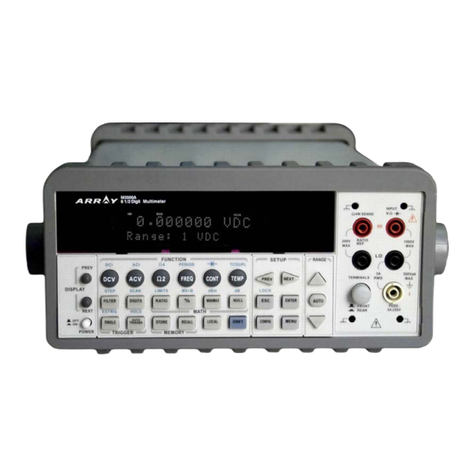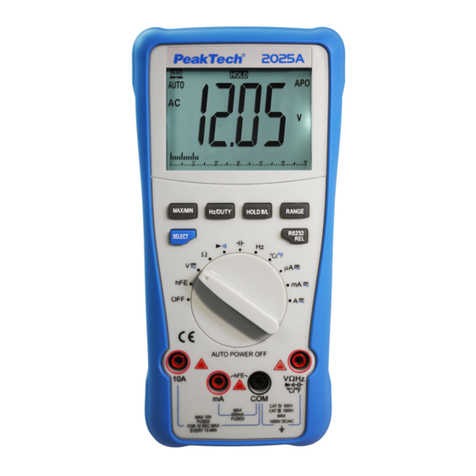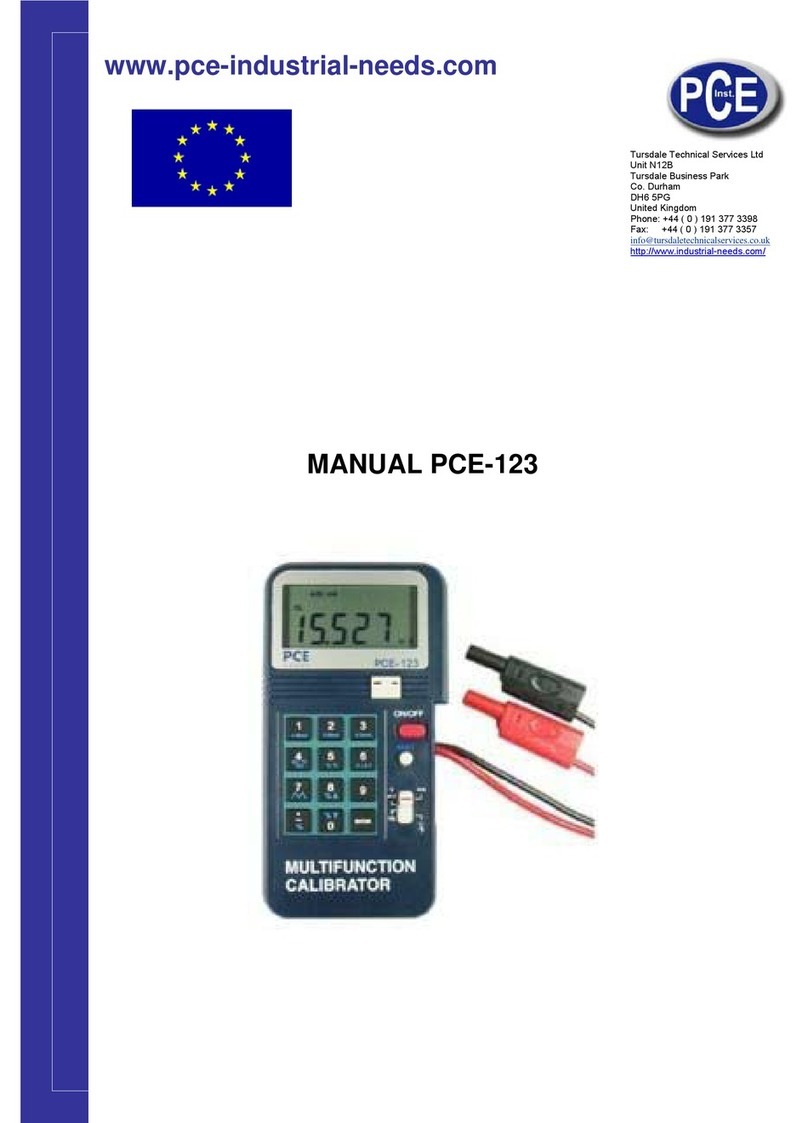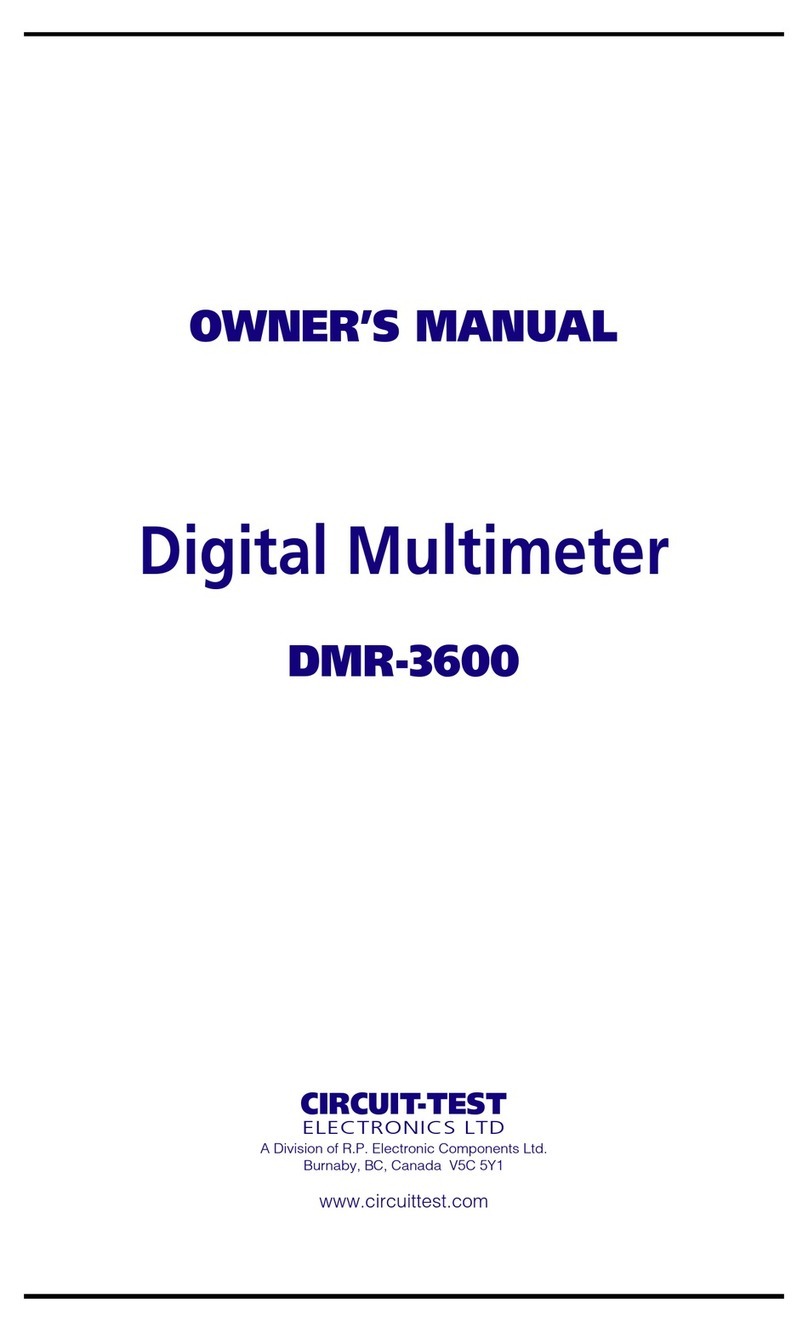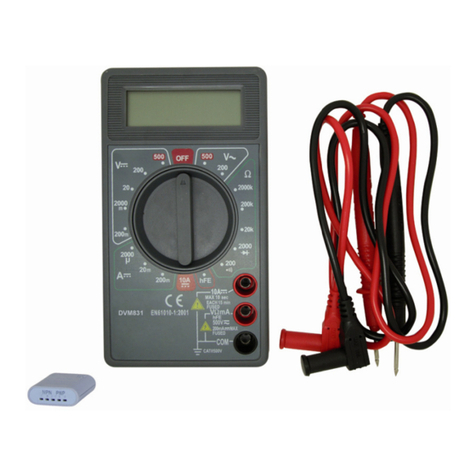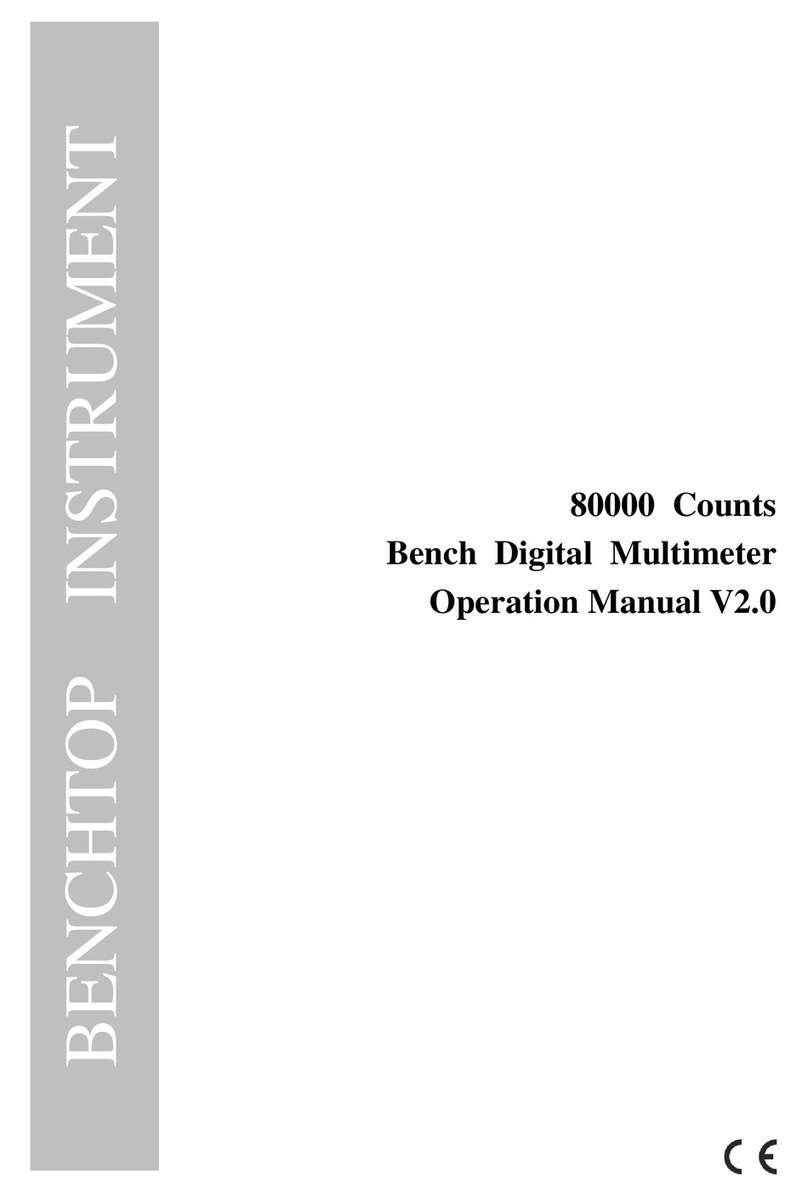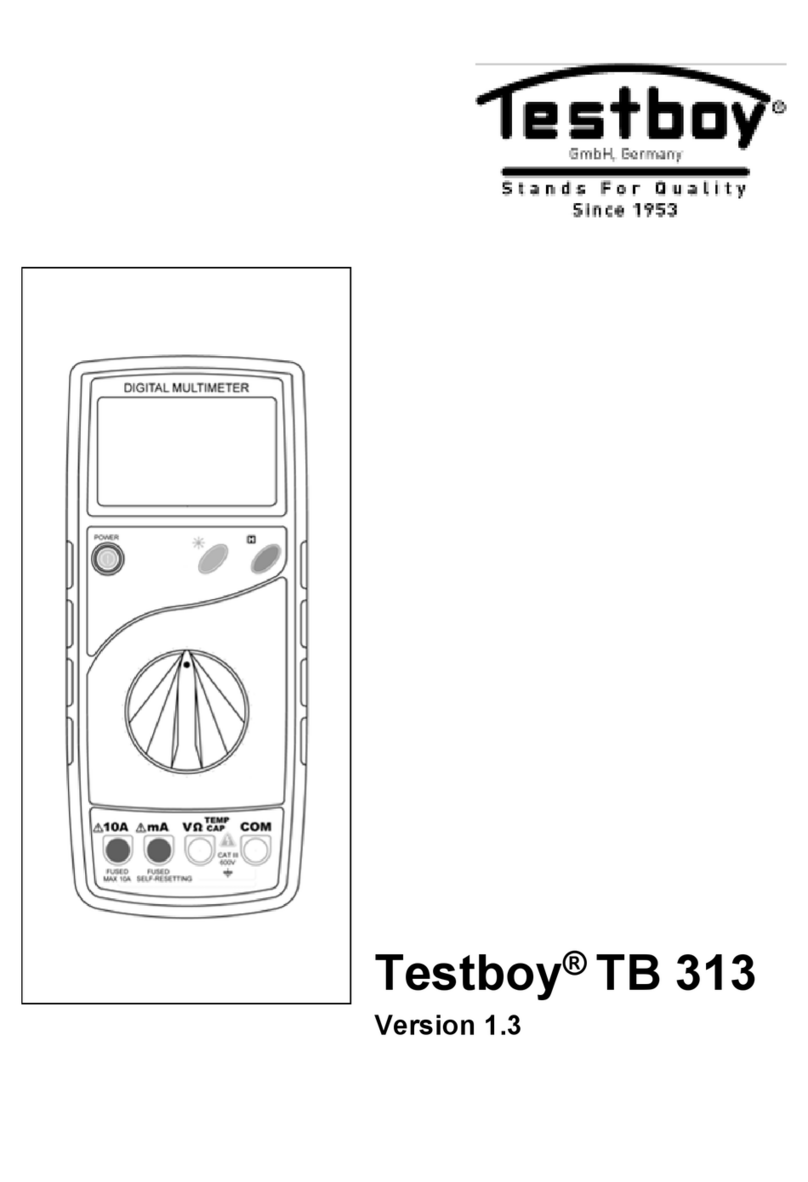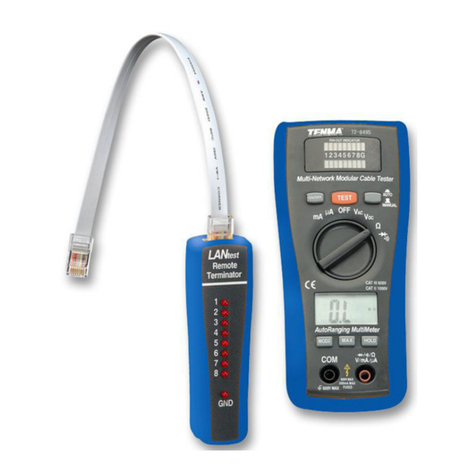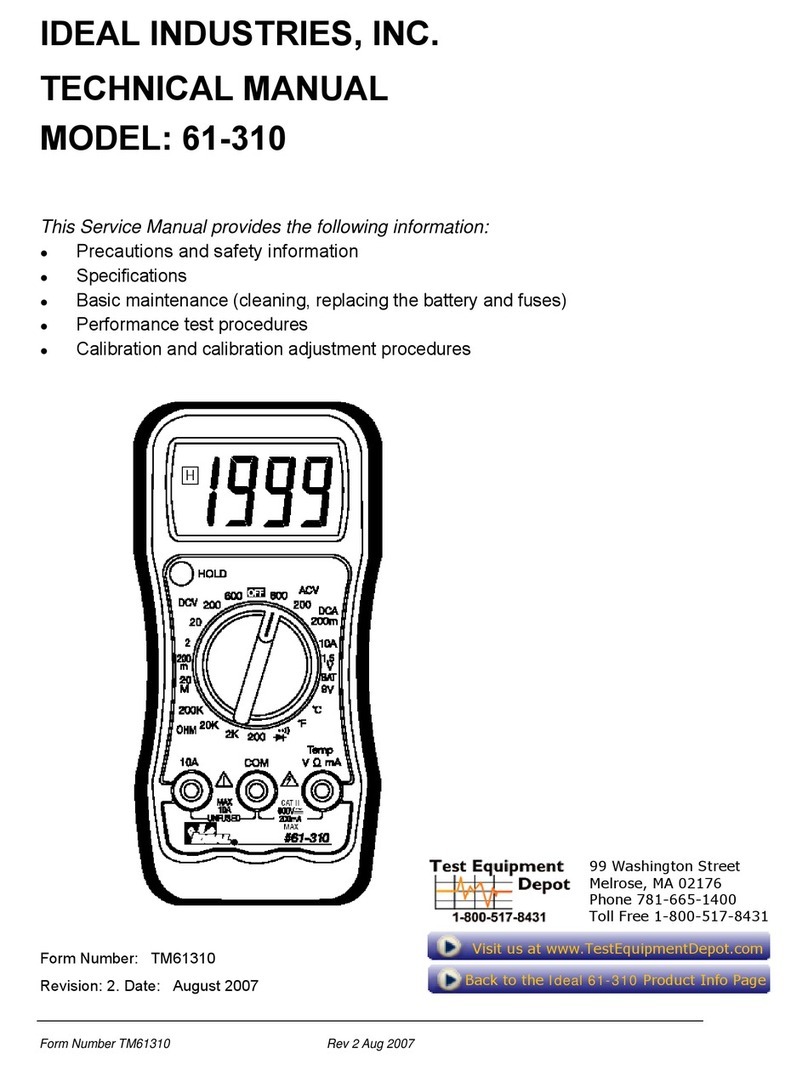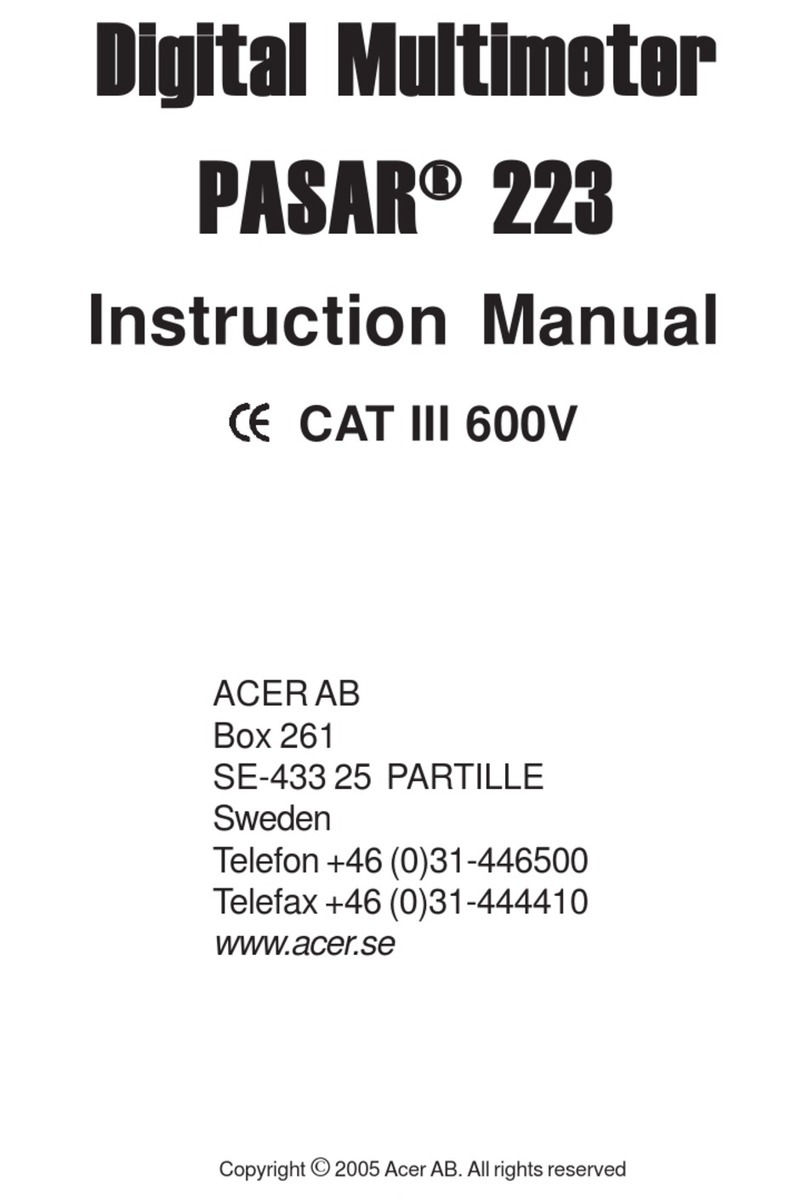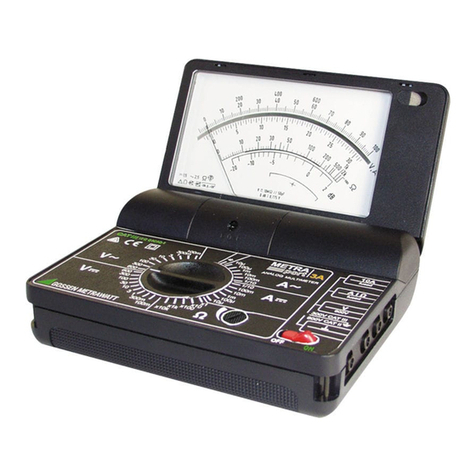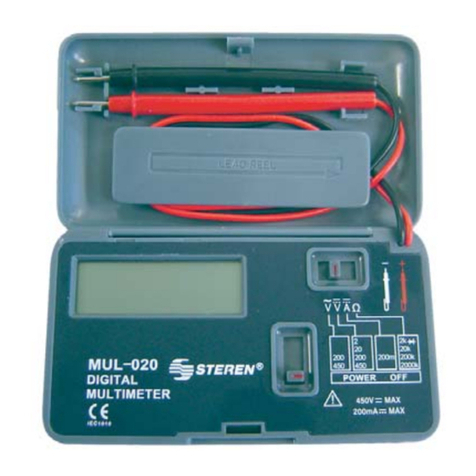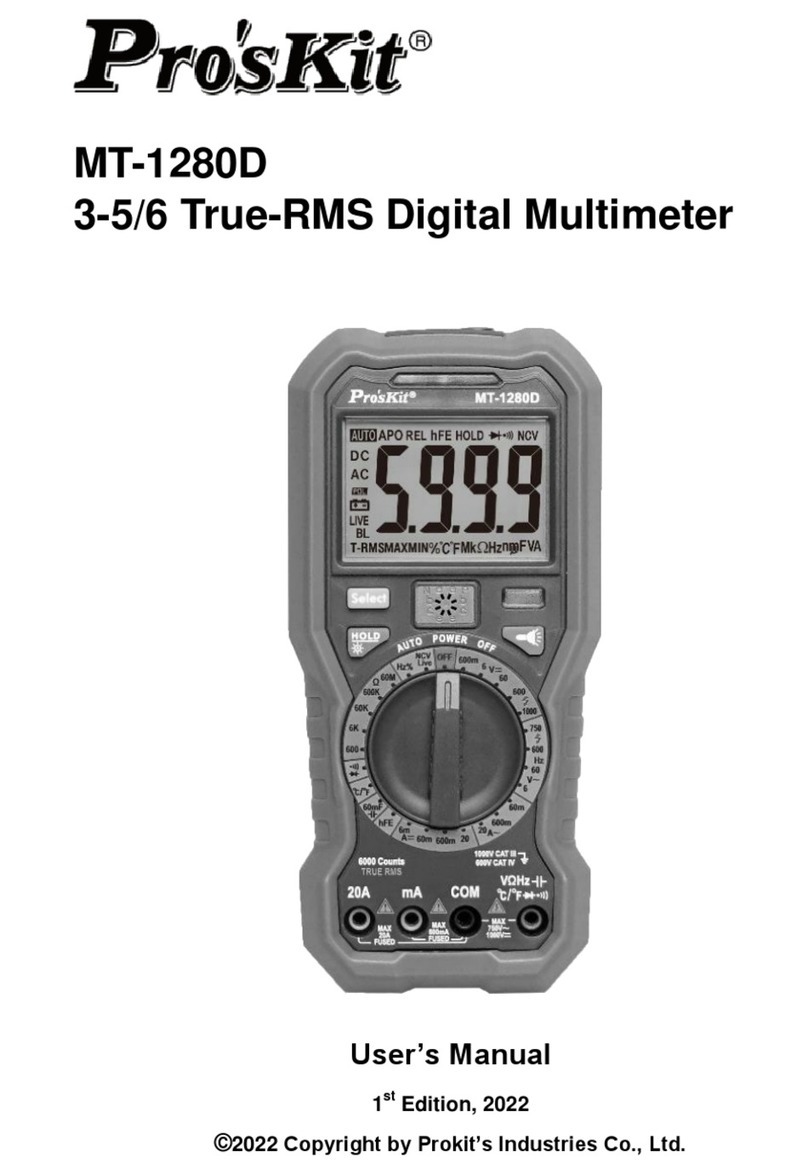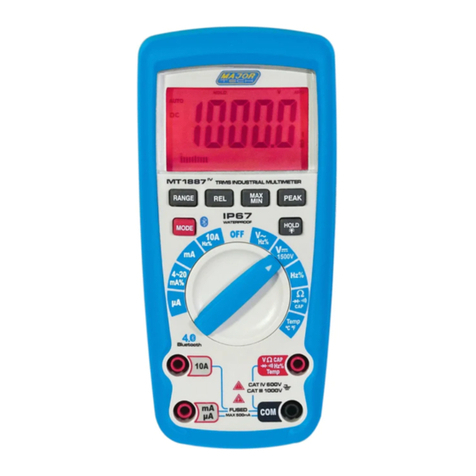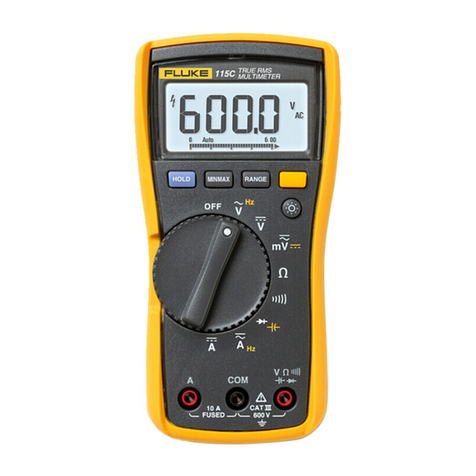Dawson Tools DDM450 User manual

DIGITAL MULTIMETER
CAT.III
600V
SERVICE
00-05-3842
Thank you for purchasing our product!
As our customers are our top priority and we strive for 100% satisfaction,
we would appreciate your feedback on the product.
Our professional support team is always ready to answer
your enquiries and provide assistance.
Please contact our customer service department at (310) 728-6220 or at
www.dawsontools.com if you have any questions regarding this product.
4
DDM450
DDM450

1
2
1. INTRODUCTION
DDM450 is a stable, safe, reliable compact digital handheld 6000 count
auto-ranging multimeter.
This meter is ideal for many situations, whether you're a professional
or causal user.
This meter can measure AC/DC voltage, AC/DC
current, resistance, continuity, diodes, non-contact voltage, and battery
test.
2. WARNINGS
Check the meter before use to make sure there was no damage during
transit.
Check that the insulation on the test leads is not damaged and/or wires
are not exposed.
If any faults or abnormalities are observed, the meter should not be used
and should be checked out prior to use.
Never exceed the protection limit values indicated in specifications for
each range of measurement.
Always be careful when working voltages above 60V DC or 30V AC rms,
keep fingers behind the probe barrier while measuring.
Make sure the rotary switch is in the correct position before measurement.
Never use the meter in an environment with explosive gas, vapor or dust.
Always keep fingers behind probe barriers when making measurements.
When connecting test leads to a circuit, connect the black test lead first,
then the red lead. Disconnect in the opposite order.
Turn off power and discharge all capacitors first before measuring
resistance, continuity or diodes.
Failure to follow safety guidelines could compromise the safety features
of this meter.
Do not use the meter without the battery cover in place
Replace the batteries as soon as
“ ” to avoid false reading that could lead to electric shock and injury.
Remove test leads from all circuits before opening the battery cover.
•
•
•
•
•
•
•
•
•
•
•
•
•
•
the low battery symbol appears.
To avoid electric shock and injury or damage to the meter, observe the
following safety methods:
This instrument from Dawson Tools Inc. will be free from defects in
workmanship and material for three years from the date of original
purchase. This warranty does not cover defects resulting from
damage caused by the user such as drops, neglect, misuse,
unauthorized alteration, usage outside of specified conditions,
contamination, or improper repair/maintenance. To receive service
on the instrument if it becomes necessary during the warranty period,
contact your nearest Dawson authorized service center at
(800) 898-6991 or visit www.DawsonTools.com to obtain a return
authorization (within the US only). A return authorization is necessary
before returning anyinstrument to Dawson; no service will be
provided without a return authorization. The user is responsible for
properly packing the unit and charges such as shipping, freight and
insurance charges. The extent of Dawson's liability is limited solely
to the repair/replacement of the instrument. The above warranty in
Its entirety is inclusive and no other warranties, written or oral, are
expressed or implied.
LIMITED WARRANTY AND
LIMITATION OF LIABILITY
Out of the Box
Check the meter and accessories thoroughly before
using the meter. Contact your local distributor if the meter or any
components are damaged or malfunction.
Accessories
• Test leads x1 pair
• User's manual x1
• 9V battery x1

4
3. SAFETY SYMBOLS 1.LCD Display
4.
2.Hold
Press “HOLD” to hold the current reading on the display. Press the button
.
3.Function Button
Press “FUNC” to switch between functions or between AC/DC current.
Backlight Button
Press “ ” to turn on the
backlight. Press the button again to turn off the backlight.
5.
6.Rotary Switch
7.Input Jack (all measurements; current below 600mA)
8.A Jack (current measurements between 600mA-10A only)
9.Common Jack (all measurements)
again to return to normal measurement
NCV Button
Hold the “NCV” button down in any mode and the meter will activate the
non-contact voltage detection. Move the top of the meter towards an AC
voltage source and the buzzer will sound and the NCV indicator will light
up if voltage is detected. Release the “NCV” button to stop NCV detection.
Important safety information
AC(alternating current)
DC(direct current)
DC/AC Voltage or Current
Double insulation protection
Fuse
Compliance with EU regulations
Ground
4. FEATURE DETAILS
3
5
4
3
2
6
8
7
9
1
4
DDM 450

4
4
2
1
6 7 9 8
4
5
3
5. DISPLAY DESCRIPTION
3
2
5
6
Direct Current
Alternating Current
Negative DC Value
Auto Power Off
Auto Range Active
7
8
Data Hold
Diode Test
9Continuity Test
6. ROTARY SWITCH FUNCTIONS
4Low Battery
12 Main Display
10
11
11
Resistance
DC/AC Current
DC/AC Voltage
2. AC Voltage:<600V
6
5
1. DC Voltage:<600V
1
4 5 6 7 8 9
2
3
1
10
11
12
DD M45 0
DD M45 0
1.Turn rotary switch to DC voltage position.
2.Connect leads across voltage source/load.
3.Read voltage measurement on the display.
1.Turn rotary switch to AC voltage position.
2.Connect leads across voltage source/load.
3.Read voltage measurement on the display.

78
4. DC /AC Current ( ):<400mAMedium
4
DD M45 0
4
7. Resistance:<40MΩ
DD M45 0
1.Turn rotary switch to A position.
2.Press FUNC to select DC or AC current.
3.Connect leads in series to circuit.
4.Read current measurement on the display.
3. DC /AC Current (large):<10A
4
DD M45 0
1.Turn rotary switch to mA position.
2.Press FUNC to select DC or AC current.
3.Connect leads in series to circuit.
4.Read current measurement on the display.
5. DC /AC Current (Small):<4000µA
4
DD M45 0
1.Turn rotary switch to µA position.
2.Press FUNC to select DC or AC current.
3.Connect leads in series to circuit.
4.Read current measurement on the display.
6.1 Continuity:
6.2 Diode Test:
4
4
DD M45 0
DD M45 0
1.Turn rotary switch to multifunction position
2.Press FUNC to switch to continuity mode
3.Connect leads across circuit.
4.If measured resistance is less than 50 , the buzzer will soundΩ
1.Turn rotary switch to multifunction position.
2.Diode mode is default mode.
3.Connect INPUT lead to anode (+) and COM lead to cathode (-).
4.Read measured forward-biased voltage drop.
1.Turn rotary switch to resistance position.
2.Connect leads across circuit.
3.Read resistance measurement on the display.

9
8. ELECTRICAL SPECIFICATIONS
DC Voltage Measurement
Range Resolution Accuracy
400mV 0.1mV
±(0.5% of reading +2 digits)
4V
40V
400V
0.001V
0.01V
0.1V
• Input impedance: 10MΩ
• Max. input voltage: 600V rms
10
600V 1V ±(0.7% of reading +2 digits)
• Safety Rating: CAT III 600V; pollution degree: II
• Operating Altitude: 2000m
• Relative Humidity: 75% max
• Operating Temperature: 0°C~40°C/32°F~104°F (<80% RH)
• Storage Temperature: -10°C~60°C/14°F~140°F (<70% RH)
• Accuracy Temperature: -18°C~28°C/64°F~82°F (<80% RH)
• Temperature Coefficient: 0.1x(specified accuracy)/°C (<18°C or >28°C)
• Sampling Frequency: approx. 3 times/sec.
• Fuse Protection: µA/mA input: FF 600mA H 600V
10A input: FF 10A H 600V
• LCD Display: 3 ¾ digit display (4000 counts)
• Supply: 9V battery
• : 150mm×74mm×48mm / 6.3"×2.9"×1.9"
• Weight:
• Safety Standards: IEC61010-1
• Pollution Degree: 2
• Accuracy: ±(of reading + # of least significant digits)
Power
Dimensions
8.9oz/250g
7. Specifications
6
DD M45 0
10. Non-Contact Voltage Detector: NCV
8. Battery Test:1.5V
4
4
9. Battery Test:9V
DD M45 0
DD M45 0
1.Turn rotary switch to 1.5V battery test position.
2.Connect leads across battery
3.Read measured voltage on the display.
1.Turn rotary switch to 9V battery test position.
2.Connect leads across battery
3.Read measured voltage on the display.
1.In any mode, hold NCV button.
2.Move top of meter near voltage source.
3.If voltage is detected, the NCV indicator flashes/buzzer beeps.
6
DDM4 50

11
12
AC MeasurementCurrent
Range Resolution Accuracy
400 Aµ 0.1µA
±(1.8% of reading +3 digits)
4000µA
40mA
400mA
1µA
0.01mA
0.1mA
• Overload protection:
µA/mA input: Fuse(FF 400mA H 600V)
10A input: Fuse (FF 10A H 600V)
• Frequency response: 40~400Hz,
calibrated to rms of sine wave (average response)
• Max. input current:
µA/mA input: 400mA rms
10A input: 10A rms
10A 10mA ±(2.0% of reading +8 digits)
Resistance Measurement
Range Resolution Accuracy
400Ω 0.1Ω
±(0.7% of reading +3 digits)
4kΩ
40kΩ
400kΩ
0.001kΩ
0.01kΩ
0.1kΩ
• Max. input voltage: 600V rms
4MΩ0.001MΩ
40MΩ0.01MΩ
Continuity Test
Resolution Description
0.1Ω If measured resistance is greater than
50Ω,the meter's buzzer will sound.
•
•
Overload protection: 600V rms
Open circuit voltage: ~1.0V DC
DC Current Measurement
Range Resolution Accuracy
400µA 0.1µA
±(1.0% of reading +5 digits)
4000µA
40mA
400mA
1µA
0.01mA
0.1mA
• Overload protection:
µA/mA input: Fuse(FF 400mA H 600V)
10A input: Fuse (FF 10A H 600V)
• Max. input current:
µA/mA input: 400mA rms
10A input: 10A rms
10A 10mA ±(2.0% of reading +8 digits)
AC Voltage Measurement
Range Resolution Accuracy
4V
40V
400V
0.001V
0.01V
0.1V
• Input impedance: 10MΩ
• Max. input voltage: 600V rms
• Frequency response: 40~400Hz,
calibrated to rms of sine wave (average response)
600V 1V
±(1.0% of reading +10 digits)

15
16
10. CLEANING
WARNING
To prevent injury or damage to the meter, do not allow moisture
inside the casing. Before opening the battery cover/case,
disconnect test leads from all circuits.
Clean the meter regularly with a damp cloth and a small amount of
detergent; do not use abrasives or solvents. Dirty/wet input jacks can
affect readings.
To clean input jacks:
1. Turn off the meter and remove test leads.
2. Brush off any dirt or contaminants from the input jacks.
3. Use a cotton swab with a cleaner/lubricant (i.e. WD40)
to clean the input jack.
4. Use a new swab on each jack to prevent cross contamination.
12. REPLACING THE FUSES
WARNING
To prevent injury or damage to the meter,
turn off power to the meter and disconnect test leads
from before opening case.input jacks
To replace the fuses:
1. Turn off power to the meter.
2. Remove test leads from input jacks.
Remove the 6 screws on the back case
and remove back case from meter.
4.
5. Replace back cover and secure to meter.
3.
Replace blow fuse(s) with new fuses of the
same electrical ratings (see specifications).
11. REPLACING THE BATTERY
To replace the :
1. Turn off power to the meter.
2. Remove test leads from input jacks.
3. Loosen the screw on the battery cover and remove cover from meter.
4.
5. Replace battery cover and secure to meter.
battery
Replace used battery with a new one.
WARNING
To avoid false reading that could lead to injury or damage to the
meter, replace the batteries as soon as the “ ” symbol appears.
Turn off the meter and remove the test leads before opening the
battery cover to avoid injury or damage to the meter.
9. MAINTENANCE
This section provides basic maintenance principles, including replacing
batteries and fuses.
Do not attempt to repair or perform any maintenance on the meter not
included in the section below unless you are qualified personnel.
13. DISPOSAL / RECYCLE
Caution: This symbol indicates that equipment and its accessories
shall be subject to a separate collection and correct disposal.
Diode Test
Resolution Description
0.001V Display shows the forward-biased
voltage drop of the diode.
•
•
•
Overload protection: 600V rms
Open circuit voltage: ~3.2V DC
Test current: ~ 1.0mA
Battery Voltage Measurement
Range Resolution Accuracy
9V 0.01V ±(1.2% of reading +7 digits)
1.5V 0.001V ±(3.0% of reading +5 digits)
Table of contents
Other Dawson Tools Multimeter manuals
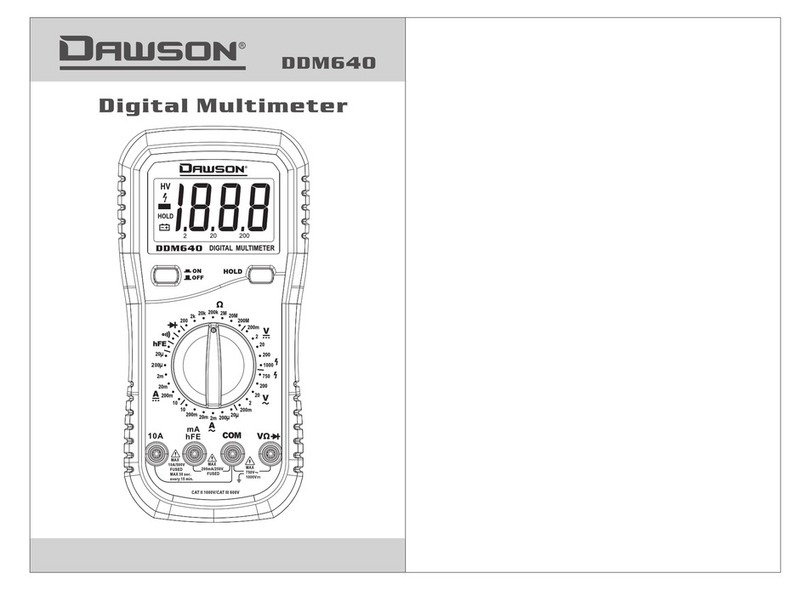
Dawson Tools
Dawson Tools DDM640 User manual
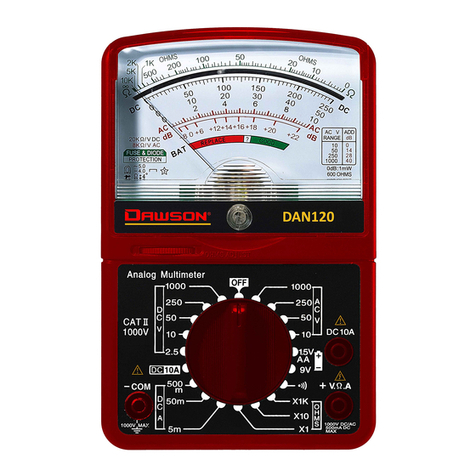
Dawson Tools
Dawson Tools DAN120 User manual
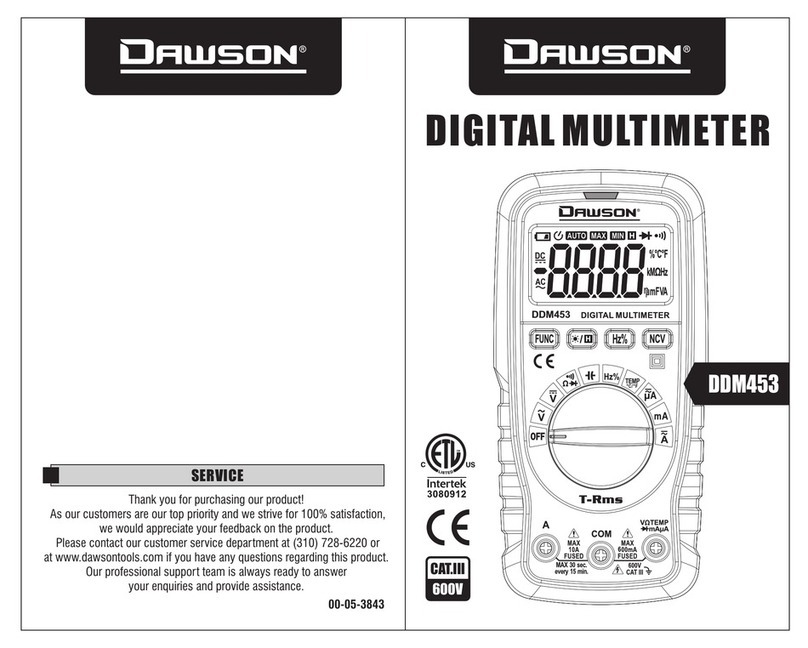
Dawson Tools
Dawson Tools DDM453 User manual
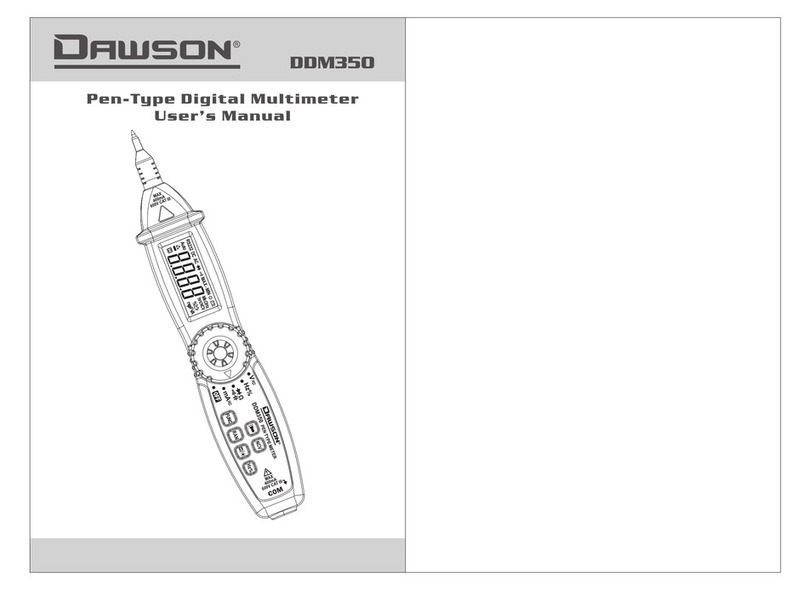
Dawson Tools
Dawson Tools DDM350 User manual
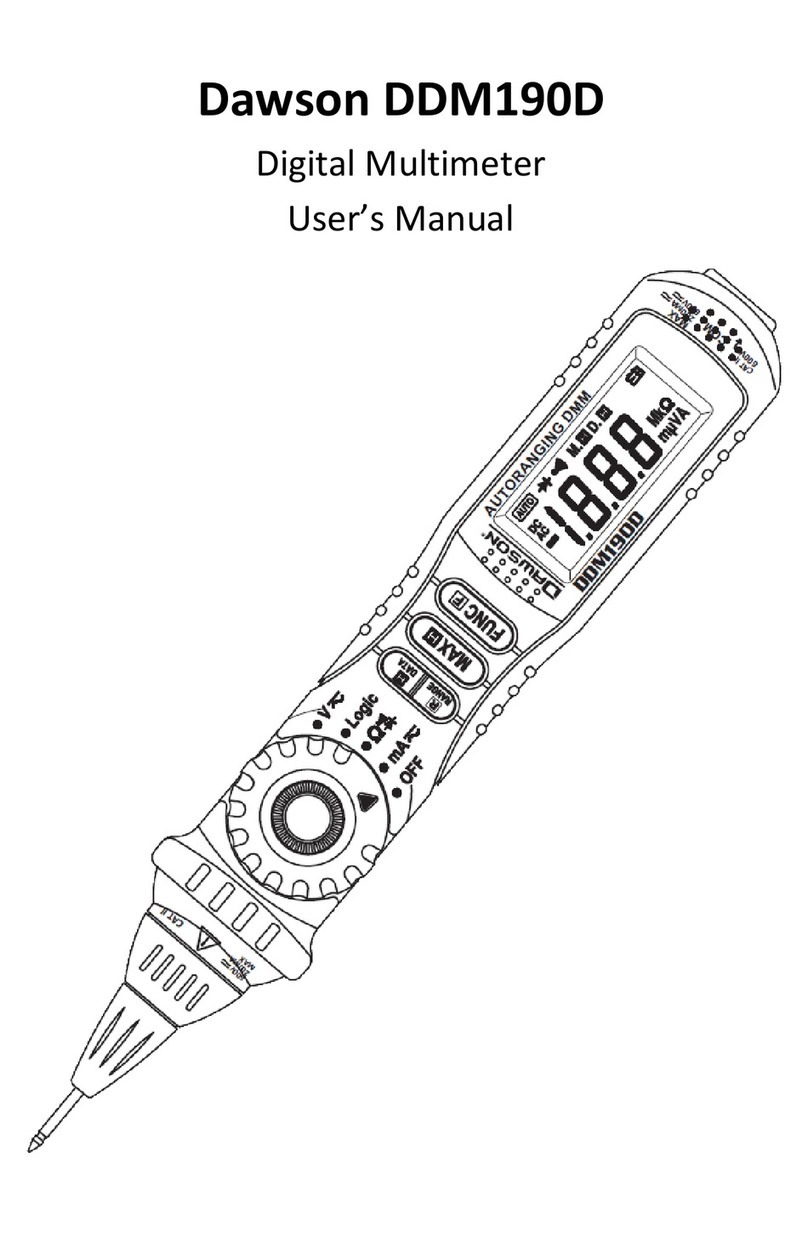
Dawson Tools
Dawson Tools DDM190D User manual
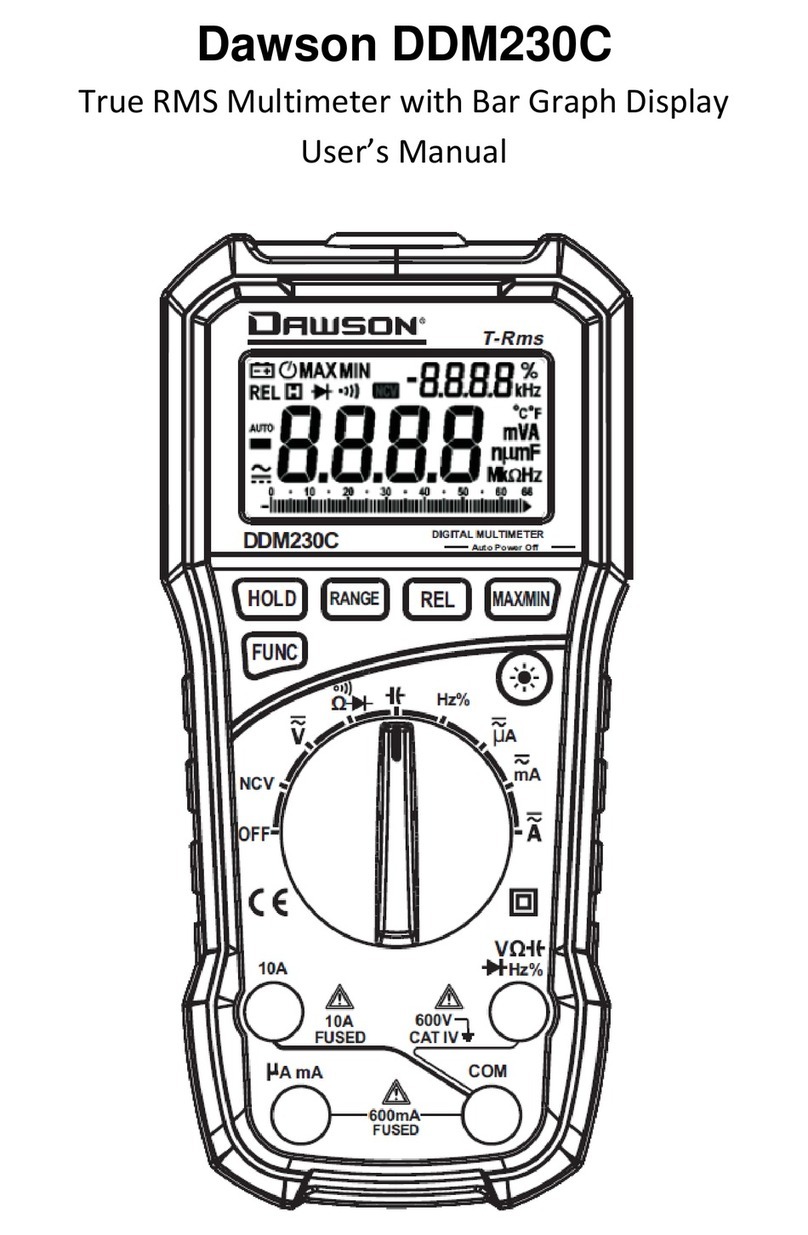
Dawson Tools
Dawson Tools DDM230C User manual
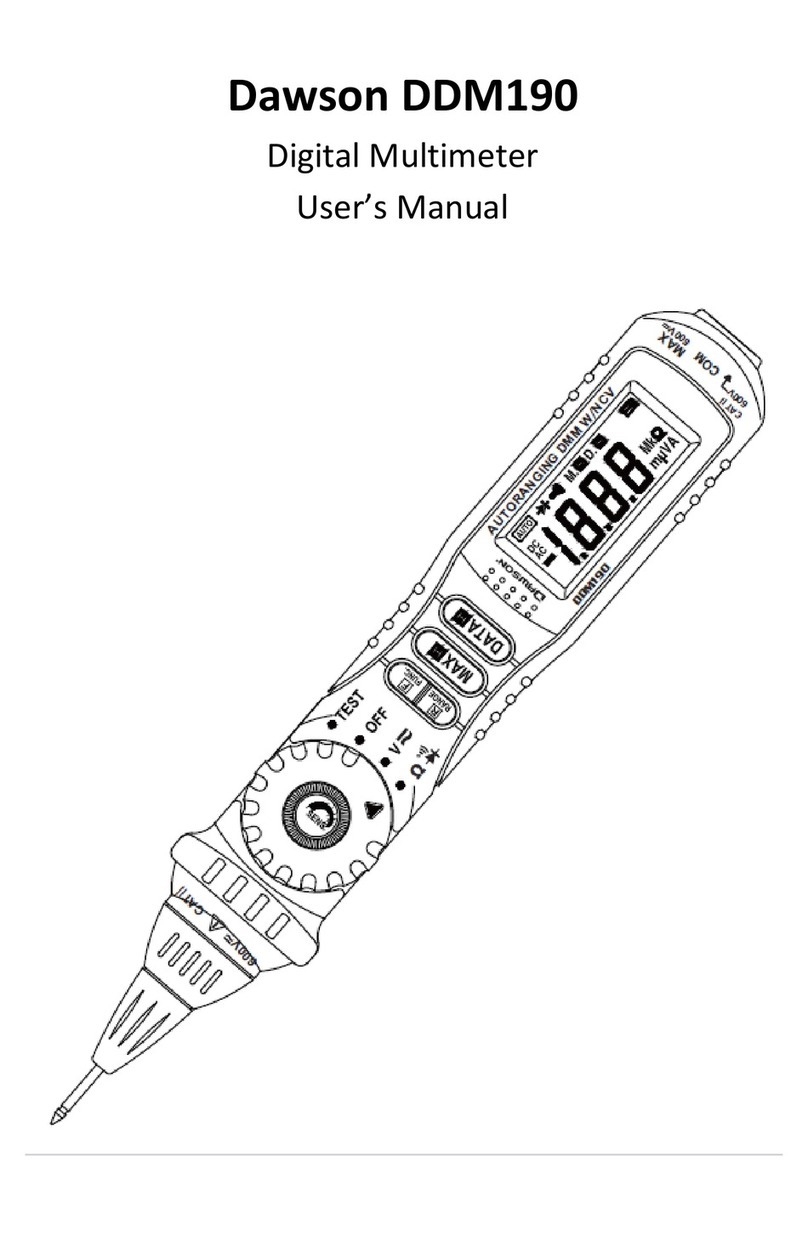
Dawson Tools
Dawson Tools DDM190 User manual
